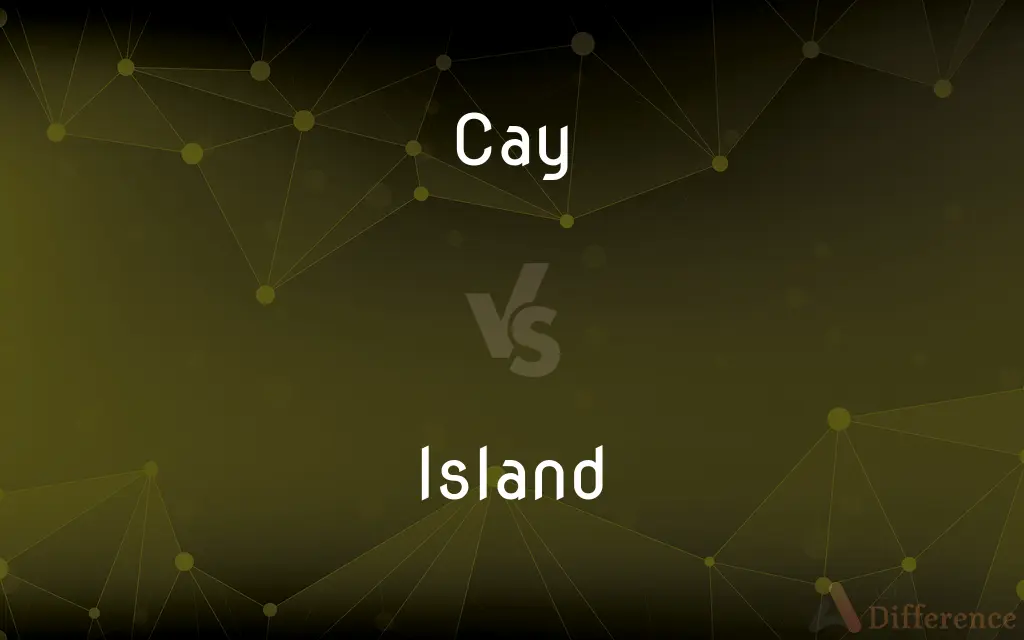Cay vs. Island — What's the Difference?
Edited by Tayyaba Rehman — By Fiza Rafique — Updated on November 2, 2023
A cay is a small, low-elevation, sandy island on the surface of a coral reef, while an island is any landmass surrounded by water.

Difference Between Cay and Island
Table of Contents
ADVERTISEMENT
Key Differences
A cay, often pronounced "key," is typically a small, sandy island formed on the surface of a coral reef. It is usually found in tropical environments such as the Caribbean. Cays are the product of ocean currents and wave action delivering and depositing sand and other sediments on top of coral reefs. In contrast, an island is a broader term referring to any landmass, regardless of size or composition, that is surrounded by water. Islands can be continental, formed by geological processes like volcanic eruptions or the accumulation of silt, and are not necessarily tropical.
Cays are characteristically flat, and their sandy surfaces are just above sea level. They may support some vegetation, but their ability to sustain diverse ecosystems is limited due to their size and the poor soil quality. Islands, on the other hand, can be mountainous or flat, large or small, and have the potential to support a wide range of biomes, including forests, deserts, and everything in between. Their size and the variety of geological processes that can form them make islands incredibly diverse.
The formation of cays is a slow and dynamic process, heavily reliant on the health of the underlying coral reef systems. Cays can change shape or disappear entirely due to storms or changes in sea levels. Islands are more stable structures, although they can also be subject to erosion, sea level changes, and geological events. Both cays and islands can be inhabited or uninhabited, but islands are more likely to have the infrastructure to support permanent human settlements.
While cays are generally formed from organic processes involving coral reefs, islands can also result from the build-up of bird droppings, which can solidify into a rocky substance known as guano. This means some islands, though not made from coral, may have similar origins to cays. Nevertheless, the size and composition of islands can vary wildly, from rocky cliffs to tropical paradises, unlike the more consistently sandy and small cays.
In a navigational context, cays can be important landmarks for mariners, just like islands. However, their small size makes cays less noticeable on maps and sometimes more challenging to detect from a distance. Islands, with their more substantial size and elevation, can be seen from further away and often serve as larger navigation markers. Both cays and islands can be tourist destinations, but islands tend to offer more in terms of accommodations and activities due to their larger size and greater resources.
ADVERTISEMENT
Comparison Chart
Size
Small, often less than a few kilometers across.
Variable, ranging from tiny to large landmasses like Greenland.
Formation
Formed on coral reefs by accumulated sand.
Formed by a variety of geological processes, like volcanic activity, erosion, or accumulation of sediment.
Elevation
Low, just above sea level.
Can range from sea level to high mountains.
Vegetation
Limited due to size and soil quality.
Can support diverse ecosystems with extensive vegetation.
Human Habitation
Less likely to support permanent settlements.
More likely to have the infrastructure for permanent human communities.
Compare with Definitions
Cay
A small, sandy island formed on the surface of coral reefs.
The boat anchored near a tiny cay before the divers plunged into the clear waters.
Island
An area of habitat separated from larger landmasses, often forming unique ecosystems.
The island's unique flora and fauna evolved over millennia in isolation.
Cay
A naturally occurring island, typically found in the tropics and sensitive to ecological changes.
The cay has been shrinking each year due to rising sea levels.
Island
A piece of subcontinental land surrounded by water and often regarded as a geographical or political entity.
The island nation was known for its vibrant culture and scenic beauty.
Cay
A low-elevation island predominantly made of sand or coral debris.
They enjoyed a picnic on the cay, with nothing but ocean for miles around.
Island
An isolated land area with varying climate zones and topographical features.
The volcanic island featured a diverse landscape, from beaches to mountain peaks.
Cay
An island that develops from the accumulation of coral sand, often hosting some vegetation like palm trees.
From above, the cay appeared as a green dot amidst a canvas of blue.
Island
An island or isle is any piece of subcontinental land that is surrounded by water. Very small islands such as emergent land features on atolls can be called islets, skerries, cays or keys.
Cay
A sandy islet that is subject to change from oceanic and weather conditions.
After the storm, the cay's shape had altered dramatically, showcasing the power of nature.
Island
Abbr. Isl. or Is. or I. A landmass, especially one smaller than a continent, entirely surrounded by water.
Cay
A cay ( or ), also spelled caye or key, is a small, low-elevation, sandy island on the surface of a coral reef. Cays occur in tropical environments throughout the Pacific, Atlantic and Indian Oceans (including in the Caribbean and on the Great Barrier Reef and Belize Barrier Reef).
Island
An unattached kitchen counter providing easy access from all sides.
Cay
A small, low island composed largely of coral or sand.
Island
A raised curbed area, often used to delineate rows of parking spaces or lanes of traffic.
Cay
A small, low island largely made of sand or coral.
Island
The superstructure of a ship, especially an aircraft carrier.
Cay
See Key, a ledge.
Island
(Anatomy) A cluster of cells differing in structure or function from the cells constituting the surrounding tissue.
Cay
A coral reef off the southern coast of Florida
Island
To make into or as if into an island; insulate
A secluded mansion, islanded by shrubbery and fences.
Island
A contiguous area of land, smaller than a continent, totally surrounded by water.
Island
(by extension, in place names) A contiguous area of land, smaller than a continent, partially surrounded by water; A peninsula; A half-island.
Despite its name, Barry Island is actually a peninsula
Island
An entity surrounded by other entities that are very different from itself.
An island of colors on a butterfly's wing
Island
A superstructure on an aircraft carrier's deck.
Island
A traffic island.
The island in the middle of a roundabout
Island
(by extension, West Midlands dialect) A roundabout; A traffic circle.
Dunton island, near Birmingham, is one of the most confusingly labelled islands in the U.K.
In Coventry, you will often hear people say: “Turn right at the island”.
Island
A bench, counter, etc., that is not connected to a wall or other furniture and which can be used from any side.
Island
(government) An unincorporated area wholly surrounded by one or more incorporated areas.
Island
(grammar) A phrase from which a wh-word cannot be extracted without yielding invalid grammar.
Island
(transitive) To surround with water; make into an island.
Island
(transitive) To set, dot (as if) with islands.
Island
(transitive) To isolate.
Island
A tract of land surrounded by water, and smaller than a continent. Cf. Continent.
Island
Anything regarded as resembling an island; as, an island of ice.
Island
To cause to become or to resemble an island; to make an island or islands of; to isle.
Island
To furnish with an island or with islands; as, to island the deep.
Island
A land mass (smaller than a continent) that is surrounded by water
Island
A zone or area resembling an island
Island
A landmass completely surrounded by water, not necessarily of any specific size or origin.
The island was a haven for rare species, isolated from the mainland.
Island
A body of land that is larger than a rock and supports human habitation or vegetation.
They sailed to a deserted island to escape the bustle of city life.
Common Curiosities
What is a cay?
A cay is a small, sandy island formed on the surface of a coral reef.
What is the primary difference between a cay and an island?
The primary difference is that a cay is a specific type of small, sandy island formed on coral reefs, while an island is a more general term that can refer to any landmass surrounded by water.
How are cays formed?
Cays are formed by the accumulation of sand and other sediments on coral reefs, often assisted by wave action and currents.
Can islands be man-made?
Yes, there are artificial islands created by humans, often for urban development or industrial purposes.
Do all islands have fresh water?
No, not all islands have fresh water; some rely on rainwater or imported water for their supply.
Can the term "island" refer to continents?
No, continents are not considered islands because they are massive landmasses, not isolated by water to the same degree.
Are all cays uninhabited?
No, while many cays are uninhabited due to their size and resources, some do have temporary or permanent residents.
Are cays always found near larger landmasses?
Not always; they can be found in the open ocean but are usually associated with coral reef systems.
Can cays support large populations?
No, due to their small size and limited resources, cays typically cannot support large populations.
Are all islands tropical?
No, islands can be found in every ocean and climate zone, from the Arctic to the equator.
Are cays safe to live on?
Cays can be vulnerable to storms and erosion, so they might not be the safest places to establish permanent residences.
How does climate change affect cays and islands?
Climate change can lead to rising sea levels and increased storm activity, which can threaten both cays and islands.
Can the terms "cay" and "key" be used interchangeably?
Yes, "cay" is often pronounced like "key," and in some regions, the terms are used interchangeably to describe small, sandy islands on coral reefs.
Do cays have their own governments?
Cays are typically too small to have their own governments and are governed as part of a larger entity.
Can islands be part of an archipelago?
Yes, islands can be standalone or part of an archipelago, which is a group or chain of islands.
Share Your Discovery

Previous Comparison
Globe vs. Sphere
Next Comparison
Illusion vs. HallucinationAuthor Spotlight
Written by
Fiza RafiqueFiza Rafique is a skilled content writer at AskDifference.com, where she meticulously refines and enhances written pieces. Drawing from her vast editorial expertise, Fiza ensures clarity, accuracy, and precision in every article. Passionate about language, she continually seeks to elevate the quality of content for readers worldwide.
Edited by
Tayyaba RehmanTayyaba Rehman is a distinguished writer, currently serving as a primary contributor to askdifference.com. As a researcher in semantics and etymology, Tayyaba's passion for the complexity of languages and their distinctions has found a perfect home on the platform. Tayyaba delves into the intricacies of language, distinguishing between commonly confused words and phrases, thereby providing clarity for readers worldwide.













































